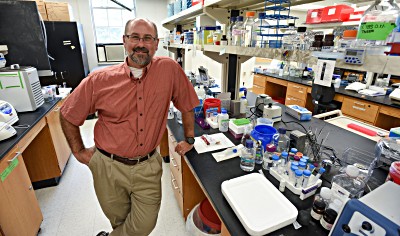
PRINCESS ANNE, MD-(June 29, 2021)- According to a January mapping study by the Environmental Working Group, significant levels of “forever chemicals” have been detected in 2,330 water systems in the U.S., including Delmarva. A University of Maryland Eastern Shore researcher was recently awarded a $600,000 Capacity Building Grant from the U.S. Department of Agriculture to study the consequences of bio-accumulation of these compounds during acute and long-term exposure.
“Per- and polyfluoroalkyl substances, better known as PFAS, are a class of persistent organic contaminants widely used in consumer products and industrial applications for the past six decades,” said Dr. Joseph Pitula, UMES Director of Research, professor of natural sciences and principal investigator for the grant. “Once they leach out of these materials, they partition into surface and ground water and then distribute in the environment. Irrigation of crops with PFAS-contaminated water can lead to contamination of soils and several studies have shown its translocation and accumulation in plants.” Exposure to PFAS, he said, is suggested to lead to adverse health outcomes in humans and animals.
Preliminary data published in the November 2020 issue of the Archives of Environmental Contamination and Toxicology Journal showed that PFAS-treated soybean and tomato plants “became more susceptible to damage by beet armyworm and larvae developed more rapidly.” Both findings, Pitula said, have implications for pest management. Also, treated plants produced more flowers but failed to develop fruits, suggesting that perfluorobutanoic acid changes some growth and development pathways in the plants.
The research group, he said, will further test these early findings. Pitula is working in collaboration with UMES researchers, Drs. Simon Zebelo (entomology and plant biology) and Victoria Volkis (chemistry), and graduate students.
“Ultimately, understanding the environmental effects of PFAS at the molecular level could provide valuable information for pest management interventions of key insect pests of fresh produce for farmers on Delmarva,” Pitula said.
Gail Stephens, agricultural communications, University of Maryland Eastern Shore, School of Agricultural and Natural Sciences, gcstephens@umes.edu, 410-621-3850.
Photo by Todd Dudek, agricultural communications, University of Maryland Eastern Shore, School of Agricultural and Natural Sciences, tdudek@umes.edu.

